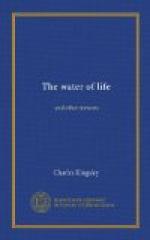Sermon XIX. Civilized barbarism
(Preached for the Bishop of London’s Fund, at
St. John’s Church,
Notting Hill, June 1866.)
St. Matthew ix. 12.
They that be whole need not a physician, but they that are sick.
I have been honoured by an invitation to preach on behalf of the Bishop of London’s Fund for providing for the spiritual wants of this metropolis. By the bishop, and a large number of landowners, employers of labour, and others who were aware of the increasing heathendom of the richest and happiest city of the world, it was agreed that, if possible, a million sterling should be raised during the next ten years, to do what money could do in wiping out this national disgrace. It is a noble plan; and it has been as yet—and I doubt not will be to the end—nobly responded to by the rich laity of this metropolis.
More than 100,000l. was contributed during the first six months; nearly 60,000l. in the ensuing year; beside subscriptions which are promised for the whole, or part of the ten years. The money, therefore, does not flow in as rapidly as was desired: but there is as yet no falling off. And I believe that there will be, on the contrary, a gradual increase in the subscriptions as the objects of this fund are better understood, and as its benefits are practically felt.
Now, it is unnecessary—it would be almost an impertinence—to enlarge on a spiritual destitution of which you are already well aware. There are, we shall all agree, many thousands in London who are palpably sick of spiritual disease, and need the physician. But I have special reasons for not pressing this point. If I attempted to draw subscriptions from you by painting tragical and revolting pictures of the vice, heathendom, and misery of this metropolis, I might make you fancy that it was an altogether vicious, heathen, and miserable spot: than which there can be no greater mistake. These evils are not the rule, but the exceptions. Were they not the exceptions, then not merely the society of London, and the industry of London, and the wealth of London, but the very buildings of London, the brick and the mortar, would crumble to the ground by natural and inevitable decay. The unprecedentedly rapid increase of London is, I firmly believe, a sure sign that things in it are done on the whole not ill, but well; that God’s blessing is on the place; that, because it is on the whole obeying the eternal laws of God, therefore it is increasing, and multiplying, and replenishing the earth, and subduing it. And I do not hesitate to say, that I have read of no spot of like size upon this earth, on which there have ever been congregated so many human beings, who are getting their bread so peaceably, happily, loyally, and virtuously; and doing their duty—ill enough, no doubt, as we all do it—but still doing it more or less, by man and God.




